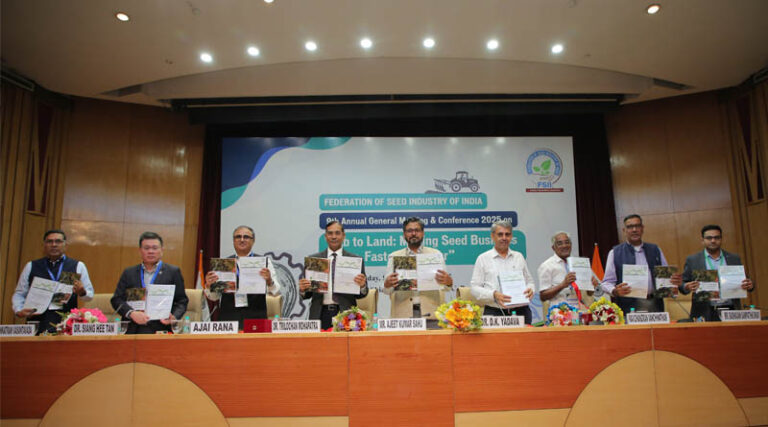
India’s Seed Industry Can Hit 10% Global Share with Policy Reforms: FSII
27 September 2025, New Delhi: With holistic policy and regulatory reforms, India’s ₹30,000-crore seed industry could unlock over ₹800 crore in additional annual economic value, bring more improved varieties to the farmers faster and raise its share in global seed trade from around 1% to 10% by 2035, says a new report by the Federation of Seed Industry of India (FSII).
The report, Ease of Doing Business in the Indian Seed Industry: Unlocking Growth Through Holistic Policy Reforms, launched at FSII’s conference coinciding with its 9th Annual General Meeting, highlights how streamlining regulations would not only strengthen India’s competitiveness but also directly benefit farmers. With these reforms, a typical seed company could introduce 3–5 new varieties each year, invest more in R&D and enable farmers faster access to innovations.
Progressive farmer from Tamil Nadu, Ravichandran Vanchinathan, underlined the urgency from a farmer’s perspective. “Farmers are demanding access to GM crops and other innovative technologies that can help us fight climate stress, pests, and diseases. We want policies that allow us to benefit from scientific progress rather than being left behind. More competition and choice in the market will ensure that high-quality seeds reach us on time. Looking back, I think the green revolution’s success was assured because at that time there was no unscrupulous activism spreading misinformation,” he said.
The report reveals that a significant chunk of regulatory friction costs estimated to be over ₹300 Crore annually for the industry, come from delays in licensing and registration, causing companies to miss crucial testing and launch window. Other major challenges include redundant variety testing, inconsistent state-level requirements divergent from the Central legislations, and cumbersome procedural complexities particularly impacting MSMEs more.
Dr Trilochan Mohapatra, Chairperson of the Protection of Plant Varieties and Farmers’ Rights Authority (PPVFRA), said that intellectual property protections are key to addressing these bottlenecks. “India made significant progress and a robust IP framework is critical for furthering the growth of India’s seed sector. Protecting breeders’ and farmers’ rights not only encourages investment in research, but also ensures that innovations reach farmers without delays. Along with IP protection, timely approval of applications is key, which is the top priority for the authority.” he noted.
The report recommends an immediate overhaul of the current regulatory framework with phased digital transformation; “One Nation, One License” approach to unify licensing across states; harmonizing the divergent requirements including and varietal testing. This, FSII estimates, could save the industry ₹382–708 crore annually, enable a 13–15% rise in R&D spending, and accelerate the introduction of new seed varieties.
Ajeet K Sahu, Joint Secretary (Seeds), Ministry of Agriculture & Farmers Welfare, said, “The government is exploring all means to boost growth of the seed sector by addressing the challenges. Initiatives like SATHI will enhance traceability and ensure farmers get good quality seeds. I welcome the seed industry to adopt a value chain approach and participate actively in programs like Public Private Partnership for Agriculture Value Chain Development (PPPAVCD).” he said.
Talking about harmonization of rules, regulations, and legislations, he noted that the government is exploring ways to integrate various acts, such as the Seed Act of 1966 and the PPVFRA Act, into a single comprehensive framework and the work on Draft Seed Bill is also underway” he said.
Adding a scientific and regulatory perspective, Dr D.K. Yadava, Assistant Director General (Seed), ICAR, emphasized the need for stronger public–private collaboration. “India’s private sector has been contributing significantly, and complementing the public sector. The government is making proactive efforts and private and public sector players need to work collaboratively to address issues including intellectual property,” he said.
Ajai Rana, Chairman of FSII and CEO & MD of Savannah Seeds, highlighted the opportunity such reforms could unlock. “Our survey shows that regulatory bottlenecks cost over ₹800 crore every year. More than 54% of Indian seed companies are MSMEs, for whom compliance costs average nearly ₹64 lakh annually. If we adopt a unified licensing system and digitize procedures, we can save ₹382-708 crore, boost R&D by up to 15%, and position India to capture 10% of the global seed market. This will not only enhance farmer incomes but also create thousands of new jobs in the sector,” he explained.
Also Read: Tropical Agro Unveils AI – Enabled Tech Tools To Tackle India’s 7 Million Tonnes Fruit Loss Problem
📢 If You’re in Agriculture, Make Sure the Right People Hear Your Story.
From product launches to strategic announcements, Global Agriculture offers unmatched visibility across international agri-business markets. Connect with us at pr@global-agriculture.com to explore editorial and advertising opportunities that reach the right audience, worldwide.






